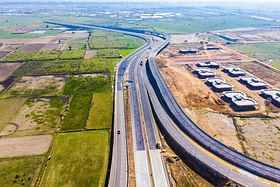The CAG report submitted in Parliament has highlighted that successful bidders were not fulfilling tender conditions or bidders were selected on the basis of falsified documents.
Flagging the issues with awarding of projects, the Comptroller and Auditor General (CAG) of India has pointed out instances of irregularities in awarding of projects, by implementing agencies.
Observing the lacunae, the CAG pointed out that this was in clear violation of the prescribed processes of tendering.
The National Highways Authority of India (NHAI) and the National Highways and Infrastructure Development Corporation Limited are the implementing agencies that develop central-funded road projects.
In its report on implementation of Phase-I of Bharatmala Pariyojana, the CAG has also found deficiencies in the appraisal and approval mechanism proposed to the Cabinet Committee on Economic Affairs (CCEA), in many of the high cost engineering, procurement and construction projects.
The CAG has named the Delhi-Vadodara Expressway and the Dwarka Expressway, which could not be assessed by either CCEA or the Ministry of Road Transport and Highways (MoRTH), to have the advantage of the scrutiny at that level.
“Even the appraisal and approval mechanism decided by CCEA was also not strictly followed,” the CAG said.
The CAG report submitted in Parliament has highlighted that successful bidders were not fulfilling tender conditions or bidders were selected on the basis of falsified documents.
Award of works without detailed project reports being approved or based on faulty detailed project report, was also pointed out.
CAG also noted that detailed project reports prepared by consultants were not appraised with due diligence by the competent authority before approval of projects.
“Instances of adoption of different specifications by contractors or concessionaires at the time of execution of projects, than what were prescribed by detailed project report consultants, highlighted the fact that specifications of detailed project reports were not found suitable as per site conditions,” the CAG said.
Pointing out that there were significant cost overruns, the CAG noted that only 75.62 per cent of CCEA approved length has been awarded while 158.24 per cent of approved financial outlay was sanctioned up to 31 March 2023.
The Phase-I of Bharatmala Pariyojana was under development up to September 2022, at an investment outlay of Rs 535,000 crore.
The CAG has observed significant changes made in the scope of projects and cost estimates, as well as, richer project specifications adopted, that have pushed up the sanctioned cost of projects.
“This has resulted in sanctioned civil cost being Rs 23.89 crore per kilometre (km) as against the CCEA approved cost of Rs 13.98 crore per km and sanctioned pre-construction cost being Rs 8.28 crore per km as against the CCEA approved cost of Rs 1.39 crore per km,” the auditor noted.
In another report, the CAG has found that NHAI continued to collect user fee in three toll plazas (namely Nathavalasa, Chalageri, Hebbalu in Southern India) during delayed period of construction.
This was in violation of rules stating that no user fee shall be levied for the delayed period, leading to higher toll collection from commuters.
This resulted in collection of user fee of Rs 124.18 crore between the period of May 2020 to March 2021, in violation of the amended toll fee rules.
Further, NHAI delayed reduction in user fee to 75 per cent of fee applicable in case of Paranur toll plaza and in case of Madpam toll plaza, annually revised the user fee.
This was done despite the stipulation of no revision of user fee during upgradation as per the amended fee rules, the CAG noted.


